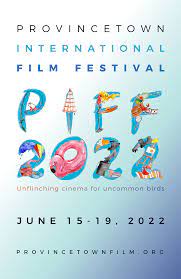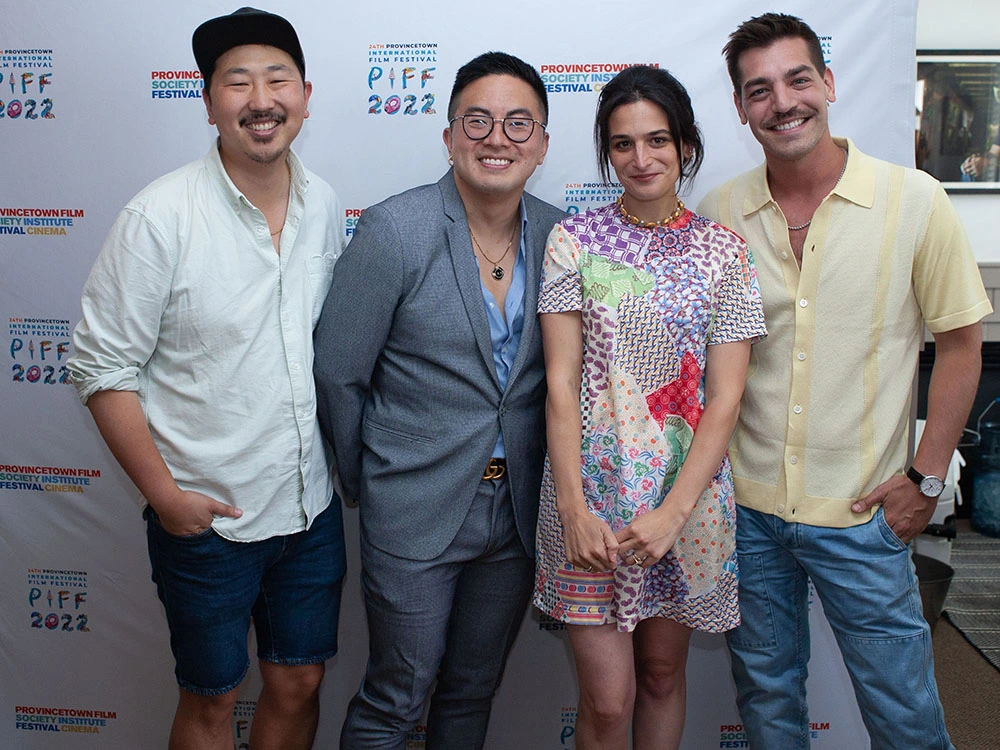 by Cheryl Eagan-Donovan
by Cheryl Eagan-Donovan
WEDNESDAY JUNE 15th
It was wonderful to be back in person in Provincetown for the 24th Annual International Film Festival! The afternoon ferry from Boston was crowded with filmmakers and the weather was perfect! We even saw a few whales on the way.
We were greeted at the pier by the fabulous Michael Colford. Founder and President of the Chlotrudis Society for Independent Film, Michael also serves on the Board of Directors for the Provincetown International Film Society. As sponsors of the festival, we were enthusiastic about seeing as many films and attending as many events as possible over the next five days.
The Provincetown Film Society reception, hosted by CUSP Gallery owner and artist Curtis Speer, provided the perfect setting for an introduction to many treasures the town has to offer as an art colony. Speer’s work is compelling in its ability to capture stark beauty in photorealism. The gallery indoor/outdoor space lent itself to intimate conversations with filmmakers and festival staff, and the oyster bar, featuring Wellfleet’s best and farm-to-table condiments, was a wonderful bonus for invited guests who arrived in town early. Among the celebrities in attendance was the legendary Christine Vachon, who shared that she had just wrapped five new film and TV projects, but then declined to elaborate. After chatting with filmmakers and festival staff, including new Executive director Anne Hubbell and longtime directors Lisa Viola and Andrew Peterson, we headed to John Dough’s rooftop for sushi.

The opening night film, Good Luck to You, Leo Grande, featuring the inimitable Emma Thompson as widowed school teacher Nancy Stokes and the gorgeous Daryl McCormack as the title gigolo, played to a full house at the Town Hall. The two leads did a great job with a dialogue-heavy and limited location script, that would have lagged and maybe even collapsed under less talents. The sex-positive and empowerment messages are clear and refreshing, but some of the turns in the script feel a bit forced. Nancy’s decision to violate the boundaries of their relationship and search for Leo’s real name provides the catalyst for the journey to come screeching to a halt, just when she is beginning to enjoy her new found ability to experience pleasure from her own body. The writer has prepared the viewer for this twist by setting up early Nancy’s prying into Leo’s family and back story, but his overly emotional response is both unexpected and out of character, especially for a professional. His confession about his mother disowning him is juxtapositioned against Nancy’s disparaging remarks about her own children, and serves as another parallel in their lives. While Nancy refuses any role-playing activities Leo suggests, their entire agreement depends on the reversal of teacher and student, and perhaps her inability to accept this is what motivates her to violate the trust they had established as service provider and client. The true star power of Thompson and relative newcomer McCormack saves the film from heavy-handedness and helps the audience suspend disbelief. Many have already noted the potential for this to be an Academy Award winning performance for Thompson, and I concur. It is also a breakout moment for McCormack, whose career should take off from here. The story is also saved by the authentic moments of humor throughout the film. In the end, McCormack’s charisma and Thompson’s fearlessness make up for any shortcomings, and allow the audience to indulge in their own fantasies of achieving true self-acceptance.
The post-screening Q&A with director Sophie Hyde was pre-recorded on Zoom but offered some insight into the process. Shot during the pandemic, using mostly natural light, the film avoids the claustrophobia of a one-set script and feels natural because of the director’s stated commitment to allowing the actors to inhabit the space and get comfortable with one another in a way that shines through in the final cut.
Next on our itinerary was the opening night party at the Crown & Anchor. Drinks poolside, passed hors d’oeuvres, and great conversation with PIFF former festival director, current board president, and realtor to the stars Gabby Hanna and her wife Marcy, and filmmaker Vanessa Vartabedian, editor of Jay Crichtley’s festival short Cheeky-NFT-Dance, all under a spectacular Strawberry moon.
THURSDAY JUNE 16th
Breakfast at Liz’s Cafe on Bradford Street – definitely worth the wait.
My first film for the day was one that had previously played Sundance, SXSW, and IFFBoston but that I had not yet seen. Fire of Love, directed by Sara Dosa, won the Jonathan Oppenheimer Editing Award at Sundance and is produced by National Geography. Visually stunning, the film focuses on the two main characters, Katia and Maurice Kraft, who are revealed to be rather one-dimensional in their shared obsession with all things volcanic. The film is also hampered by the overly dramatic whispering narration by Miranda July. The images of the intrepid heroes in their silver fire retardant suits are other-worldly, reminiscent of a 1950s aliens-in-space movie, and the footage of the active volcanoes is truly spectacular; the lava looks like a living, breathing monster at times, but the central relationship, characterized by one colleague as “volcanic” never achieves that level of conflict. Katia objects to some of Maurice’s crazy ideas like taking raft in an acid lake, or his dream of canoeing down a lava flow in Hawaii, but the sparks never fly. There are no surprises in the couples’ career trajectory as we are told at the outset that there last volcano shoot took place in 1991. The archival footage of Maurice’s films and their TV appearances help to tell the story but fail to offer any insight into why they were willing to die to capture the images, with the possible exception of Maurice’s statement early in the film when he explains that he is “disappointed with humanity”. Their research certainly did contribute to the scientific understanding of how red and gray volcanoes work, and allowed them to create an early warning system that unfortunately failed to save lives in Colombia in 1985. Perhaps the poignancy is only to be found in the fact that their mutual first loves were Mount Etna and Stromboli, and that in creating the mythology of their own partnership, including three different versions of how they met, they also shared a fatal determination to try and outwit the explosive force of the killer gray volcanoes. Maurice’s words are prescient when he says that he knows “it will kill me one day” and we are left with his observation “how great is the ambition and vanity of man”.
Lunch at the hospitality suite at Gabriel’s included sandwiches from Box Lunch, and an assortment of sweets and beverages. I had never been to the inn before, despite many years as a visitor to town. I was impressed with the lobby, the pop-up cabaret performance space, and garden and patio in back – the perfect location to meet up for a quick bite between films with my fellow Chlotrudis sponsors.
After lunch, I went to the Art House for the short film program, New England Shorts. The first film Monsieur Le Butch, directed by Jude Dry, is a cute meta piece about a mom and her trans son. The script is funny and authentic, and the tone was just right: sweet but never maudlin or cloying. Winner of the Best New England Short Film.
Have A Good One felt a little forced, more like a stage play with the focus on dialogue. As a short it works because it has one major turn and a clever script. The best visual moment was the neon “Jesus Saves” sign on the building in the opening shot that foreshadows the ending.
Where It Happened is a revenge fantasy that just did not work for me. It was full of clichés and too violent. Skin and Bones was even worse. The plot made no sense and the violence was unnecessary.
Cheeky-NFT-Dance is a sly commentary on “art” by the local master, Provincetown’s self-appointed curator Jay Crichtley, whose ability to transform the landscape into a political and environmental statement is renowned. This two-minute meditation does not disappoint.
Rated R was terrible. Not funny.
Reggie Cabral: Larger than Life Terrorist was the reason I chose this shorts program. Having come to Provincetown for years, I was well acquainted with the mythology and the complexity of the man who owned the A House. I still remember distinctly the shock of learning that he had died in 1996 and the void that was left in the community. This personal reflection from his daughter Jennifer was both illuminating and moving. An intimate portrait told with words and images, it includes an audio recording of Reggie talking about Tennessee Williams, where he claims that the author wrote almost all of The Glass Menagerie at the Little Bar at the Atlantic House. Jennifer shares the varied stories about the how her parents met and married, reveals her father’s bisexuality and the fact that he was not open about that aspect of his life, and comments on his notorious charisma and temper. She dispels the revenge legend that grew up around her mother’s involvement in the creation of the Boatslip and credits her with the birth of its tea dance, and offers two very powerful moments in her relationship with him. Her story about his angry response to her criticism of the ACT UP! protesters during the height of the AIDS crisis, how it impacted her understanding of who he was, and how deeply he felt the harrowing loss of lives, along with her vivid description of the first time she ever saw him cry at the end of his life when he was stricken with palsy, were absolutely riveting. I spoke with director Adam Golub at the School House party and told him it was my favorite film in the program, and he explained that it is one of a series of portraits screening as part of an exhibit at the Monument this summer. The film offers an in-depth, behind-the-scenes look at one of the most influential partnerships in Provincetown history: not to be missed.
I left the Shorts program a bit early to get to the next event, and missed Basketart Court by Xray Aims, which I heard was quite good.

The Next Wave Awards Conversation with recipients Jenny Slate and Bowen Yang took place in the Paramount Room at the Crown and Anchor and was hosted by Provincetown’s own comedian Judy Gold, which must have seemed like a good choice at some point, but it quickly became clear that she thought the event was all about her. She noted that Jenny and Bowen looked like they were dressed for a Vogue photo shoot, and it’s true – they were chic and sophisticated, especially in contrast to Judy’s “loudmouth” style. Asked about the themes of community and “fitting in” in their respective films, Marcel The Shell with Shoes On, a feature length exploration of the popular short film series, and Fire Island, which is loosely based on Jane Austen’s Pride and Prejudice, both actors talked about the search for a sense of belonging and the journey to not needing approval of “others”. Bowen talked about the genesis of the script for Fire Island, a mix between The Island of Misfit Toys and Mean Girls. He explained that it began with the his own and writer and actor Joel Kim Booster’s shared experiences in the gay summer haven, and the obvious divisions of class and race that exist within the queer world. When asked if he prefers Fire Island or Provincetown, Bowen was quick to say how much he and his partner Matt were enjoying Provincetown on this their first visit. Jenny pointed out that the film is not just a rom-com, but that ending was truly romantic. Judy asked Bowen about the fact his parent had sent him to conversion “therapy” and he was both gracious and eloquent in his response. He explained that his parents were “science-minded” people, his mother a medical professional and his father having earned a doctoral degree, and that they were culturally divorced from the Western world and TV, and in acknowledging that the process is very destructive and damaging, he said that the experience made him fight even harder for his own queerness. “No one can say I’m not queer enough. I’m secure in my identity as someone who struggled for it.” Jenny talked about her experience growing up in Milton, Massachusetts, and hoping to play the lead in her school musicals, especially Annie. I had previously heard Jenny speak at a Zoom event about her film Obvious Child, but seeing her and Bowen in person, I was struck by how charming and professional they both were.
Thursday night’s feature documentary at the Town Hall was All Man: The International Male Story, directed by Bryan Darling and Jesse Finley Reed. The film tells the story of a mail order catalogue, the people who made it happen, and the images that defined an era and changed the way men thought about clothes and themselves. With great archival footage, the film integrates the points of view of the founder, the models, the staff, and the fans of the retail publication: the men whose lives were changed by the photos on the pages. As important to young gay men in the Midwest in the 1970s as the Sears Roebuck catalogue was to pioneers in the 1890s, International Male provided a link to the real world along with a healthy dose of fantasy – a lifeline to the future – and its arrival in the mail was always highly anticipated. At 83 minutes, the film never falters; it moves deftly from the inception of a new concept for men’s underwear, through the sexual revolution of the 1970s, to the AIDS crisis and the loss of several key staff, crafting a close-up portrait of a significant moment in American fashion history that redefined masculinity.
After a quick stop in at the Industry Party, I returned to the Town Hall for the 50th Anniversary screening of John Waters’ infamous opus, Pink Flamingos. The audience response to Waters when he introduced the film and the several cast members who were in attendance was pure adulation: a standing ovation and enthusiastic applause throughout the entire opening credits sequence as the names of the stars appeared on screen, especially Divine, Edith Massey, and Mink Stole. Waters asked how many had never seen the film before, and said that it was great to see so many young people in the audience. A true masterpiece of “trash”, the film features the creative use of meat in several scenes, especially the flasher scenes, which are perfect in their absurdity. I had seen the film at the Orson Welles Cinema in the 1980s, but had since forgotten many of the details: the extended shot of trailer devoured by flames, the singing orifice at the party, and the “love” scene with Babs and Crackers. Edith Massey as the Egg Lady, Mink Stole as the evil Connie, and the one and only Divine as herself are brilliant in these National Registry of Film and Academy Museum-worthy performances that are, like the film, timeless. I have often said that John Waters is our American Fellini and here is proof at 24 frames per second.
